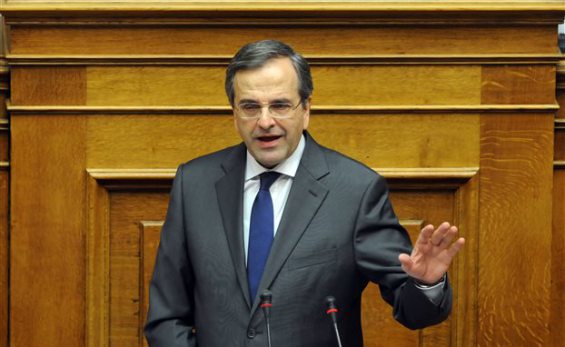Greece dissolved its Parliament on Wednesday, preparing for early general elections this month that could provoke a showdown with its creditors and cause turmoil in financial markets.
The vote, a constitutional requirement after Parliament failed to choose a president, is widely depicted as a referendum on the austerity measures imposed by the country’s creditors in return for multibillion-dollar bailouts.
By tradition, the dissolution was announced in a decree posted at the door of the Parliament building in Athens.
The dissolution followed a vote in Parliament on Monday when the government of Prime Minister Antonis Samaras failed to muster enough support for its presidential candidate, Stavros Dimas, setting in motion procedures for elections to be held on Jan. 25.
The ballot will pit Mr. Samaras’s conservative New Democracy party against the left-wing party Syriza led by Alexis Tsipras, which has emerged as the front-runner in opinion surveys. Syriza has drawn support by promising to cancel austerity programs and demand the cancellation of debt.
Syriza’s lead has narrowed in recent weeks, however, opening the way for smaller parties, some of them relatively new, to act as kingmakers if the bigger contenders do not win enough seats to control the 300-seat chamber outright.
Mr. Samaras’s followers say that if Syriza wins and begins to redeem its pledges, Greece will plunge back into crisis and isolation.
“This struggle will determine whether Greece stays in Europe,” Mr. Samaras told President Karolos Papoulias on Tuesday, according to Agence France-Presse. One of the new Parliament’s first tasks will be to elect a successor to Mr. Papoulias, 85, whose term expires in March.
Syriza has said it wants to renegotiate two bailouts worth 240 billion euros, or about $292 billion, from Greece’s so-called troika of lenders — the European Commission, the European Central Bank and the International Monetary Fund — and to persuade creditors to write off some of the country’s crippling debts.
Mr. Samaras’s governing coalition has, with some reluctance, pursued deeply unpopular austerity policies demanded by lenders and backed particularly by Germany. But early signs of economic improvement have not translated into tangible benefits for average Greeks laboring under a surge in joblessness and widespread hardship.
The European battle lines over the election seemed to harden on Wednesday when Michael Fuchs, a senior member of Chancellor Angela Merkel’s party in Germany, warned Syriza to expect little sympathy.
“The times when we had to rescue Greece are over,” he said in an interview in the newspaper The Rheinische Post. “There is no longer any potential for blackmail. Greece does not have systemic meaning for the euro.”
If Mr. Tsipras “believes he can pull back from the reform efforts and savings measures, then the troika will also have to pull back on credits for Greece,” Mr. Fuchs added.



















